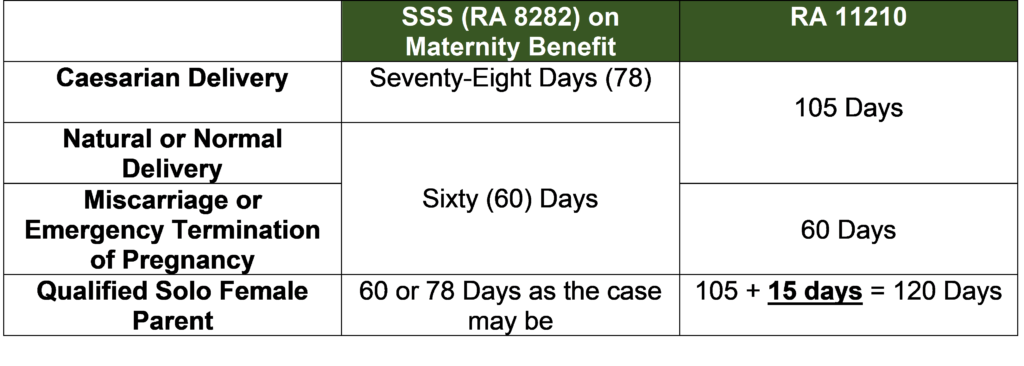
Published — March 27, 2019
The following post does not create a lawyer-client relationship between Alburo Alburo and Associates Law Offices (or any of its lawyers) and the reader. It is still best for you to engage the services of your own lawyer to address your legal concerns, if any.
Also, the matters contained in the following were written in accordance with the law, rules, and jurisprudence prevailing at the time of writing and posting, and do not include any future developments on the subject matter under discussion.
Read also: Understanding SSS and its benefits
Our Constitution provides that it is the duty of the state to protect and strengthen the family as a basic autonomous social institution and to equally protect the life of the mother and the life of the unborn from conception (1987 Constitution, Article 2, Section 12). Aside from this, the state shall also protect working women by providing safe and healthful working conditions, taking into account their maternal functions, and such facilities and opportunities that will enhance their welfare and enable them to realize their full potential in the service of the nation (1987 Constitution, Article 13, Section 14). These constitutional declarations are the foundation for the enactment of Republic Act No. 11210 (RA 11210) or the 105-day Expanded Maternity Leave Law.
The Expanded Maternity Leave Law was passed in recognition of women’s maternal function. Through this law, women will be given ample transition time to regain health and overall wellness as well as to assume maternal roles before resuming paid work (Sec. 2 of RA 11210).
Entitlement to Maternity Leave Benefit
In General
All covered female workers in the public and private sector including those in the informal sector, regardless of civil status or the legitimacy of her child, shall be granted one hundred five (105) days maternity leave with full pay and an option to extend for another thirty (30) days without pay (Sec 3 of RA 11210). The option to extend for another 30 days can be availed of upon written notice to the employer, at least forty-five (45) days before the end of her maternity leave (Secs. 4 & 5 of RA 11210). Another fifteen (15) days is granted to workers qualified under the Solo Parents Welfare Act. In case of pregnancy miscarriage or termination of pregnancy, sixty (60) days maternity leave with full pay shall be granted to the female worker (Sec 3 of RA 11210). This is a big leap on the benefits granted for women because almost twenty-seven (27) to sixty (60) days are added to the female workers’ maternity leave benefits, and this is regardless whether the woman gave birth via caesarian section or natural delivery. A short comparison of the old and new maternity benefits is provided below:

National Athletes
In line with the objective to empower the rights of women, the law also provides a special provision on maternity benefits for female national athletes. When a national athlete becomes pregnant, she will be referred to the team physician or an accredited physician of the Philippine Sports Commission (PSC) or an obstetrician-gynecologist to determine her fitness to continue training. She will be allowed to participate in all team-related activities, unless the physician advises that participation is not medically safe or should be limited. Upon medical advice, she shall go on maternity leave until cleared to return to training. She shall continue receiving her allowance and be entitled to the same benefits while on maternity leave prior to childbirth and up to six (6) months after, unless she can resume sooner as advised by her physician, in which case, she will be entitled to the allowance and benefits she had prior to pregnancy. The female national athlete employed in the public sector, however, shall not receive double compensation or benefits (Sec. 13 of RA 11210).
Post-Employment and Administrative Case
Maternity leave with full pay shall also be granted to women even if the childbirth, miscarriage, or emergency termination of pregnancy occurs not more than fifteen (15) calendar days after the termination of an employee’s service, as her right thereto has already accrued. However, if the female worker was terminated without just cause, the employer shall pay her the full amount equivalent to her salary for one hundred five (105) days for childbirth and sixty (60) days for miscarriage or emergency termination of pregnancy based on her full pay, in addition to the other applicable daily cash maternity benefits that she should have received had her employment not been illegally terminated (Sec. 8 of RA 11210). In addition, even if the female worker in the government service or private sector has pending administrative case, she shall still be entitled to receive Maternity Leave Benefits (Sec. 12 of RA 11210).
Maternity Leave Benefits, How Exercised
The enjoyment of maternity leave cannot be deferredbut should be availed of before or after the actual period of delivery in a continuous and uninterrupted manner, not exceeding one hundred five (105) days, as the case may be. It shall be granted to female workers in every instance of pregnancy, miscarriage or emergency termination of pregnancy (Sec 3 of RA 11210).
Maternity Leave benefit can also be credited as combinations of prenatal and postnatal leave as long as it does not exceed 105 days and provided that compulsory postnatal leave shall not be less than 60 days (Sec. 9 of RA 11210).
Any female worker may also exercise her rights over maternity leave benefit through allocation up to seven (7) days of said benefits to the following:
- Child’s father, regardless whether or not the same is married to the female worker;
- In the death or incapacity of the child’s father, the benefit may be allocated to an alternate caregiver who may be a relative within the fourth degree of consanguinity; or
- The current partner of the female worker sharing the same household upon the election of the mother taking into account the best interests of the child.
The allocation of maternity benefits shall be exercised through written notice issued to the employers of the female worker and alternate caregiver (Sec. 6 of RA 11210).
In the event death or permanent incapacity of the beneficiary female worker, the balance of her maternity leave benefits shall accrue to the father of the child or to a qualified caregiver as provided above (Ibid).
Matters Concerning Maternity Leave for Female Workers in the Private Sector
A female SSS member who has paid at least three (3) monthly contributions in the twelve (12)-month period immediately preceding the semester of her childbirth, miscarriage, or emergency termination of pregnancy shall be paid her daily maternity benefit which shall be computed based on her average monthly salary credit for one hundred five (105) days, regardless of whether she gave birth via caesarian section or natural delivery, subject to the following conditions:
- That the female worker shall have notified her employer of her pregnancy and the probable date of her childbirth, which notice shall be transmitted to the SSS in accordance with the rules and regulations it may provide;
- That the full payment shall be advanced by the employer within thirty (30) days from the filing of the maternity leave application;
- That payment of daily maternity benefits shall be a bar to the recovery of sickness benefits provided under Republic Act No. 1161, as amended, for the same period for which daily maternity benefits have been received;
- That the SSS shall immediately reimburse the employer of one hundred percent (100%) of the amount of maternity benefits advanced to the female worker by the employer upon receipt of satisfactory and legal proof of such payment; and
- That if a female worker should give birth or suffer a miscarriage or emergency termination of pregnancy without the required contributions having been remitted for her by her employer to the SSS, or without the latter having been previously notified by the employer of the time of the pregnancy, the employer shall pay to the SSS damages equivalent to the benefits which said female member would otherwise have been entitled to.
The female workers availing of the maternity leave period and benefits must receive their full pay. Employers from the private sector shall be responsible for payment of the salary differential between the actual cash benefits received from the SSS by the covered female workers and their average weekly or regular wages, for the entire duration of the maternity leave, with the following exceptions, subject to the guidelines to be issued by the Department of Labor and Employment (DOLE):
- Those operating distressed establishments;
- Those retail/service establishments and other enterprises employing not more than ten (10) workers;
- Those considered as micro-business enterprises and engaged in the production, processing, or manufacturing of products or commodities including agro-processing, trading, and services, whose total assets are not more than Three million pesos (₱3,000,000.00); and
- Those who are already providing similar or more than the benefits herein provided.
These exemptions are subject to an annual submission of a justification by the employer claiming exemption for the approval of the DOLE (Sec 5 of RA 11210).
In case of female workers who are neither voluntary nor regular members of the SSS, their maternity benefits shall be governed by the Philippine Health Insurance Corporation (PhilHealth) Circular No. 022-2014 or the Social Health Insurance Coverage and Benefits for Women About to Give Birth (Sec. 11 of RA 11210).
State’s Commitment on Women’s Empowerment
The State is committed to its social responsibility to empower women’s rights through the enactment of this law. This is also shown through the commitment of government agencies such as the Civil Service Commission (CSC), the DOLE, the SSS, and the Gender Representative of the Commission on Human Rights (CHR), in consultation with trade unions, labor organizations, and employers’ representatives on the continuous review of the implementation of this law for its further improvement (Sec. 17 of RA 11210).
Alburo Alburo and Associates Law Offices specializes in business law and labor law consulting. For inquiries, you may reach us at info@alburolaw.com, or dial us at (02)7745-4391/0917-5772207.
All rights reserved.
SUBSCRIBE NOW FOR MORE LEGAL UPDATES!
[email-subscribers-form id=”4″]



Needed to draft you this little bit of word to help thank you the moment again for the exceptional principles you’ve documented in this case. This is simply remarkably generous with people like you to deliver publicly exactly what a lot of people would have offered for sale for an e book to help with making some profit for themselves, primarily now that you might well have tried it if you ever wanted. Those creative ideas also worked like a great way to be sure that many people have a similar zeal the same as my own to learn whole lot more related to this problem. I believe there are thousands of more fun times up front for people who discover your blog post.